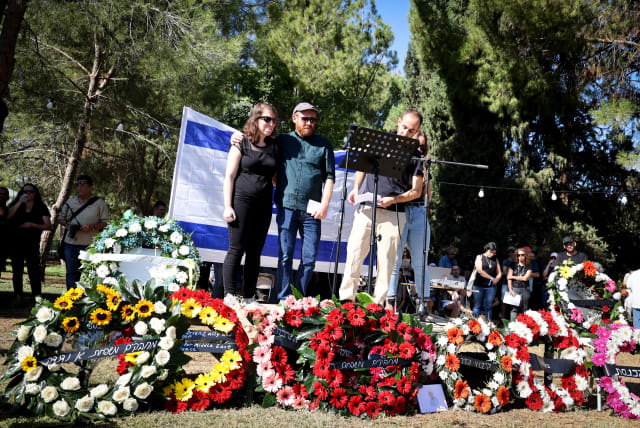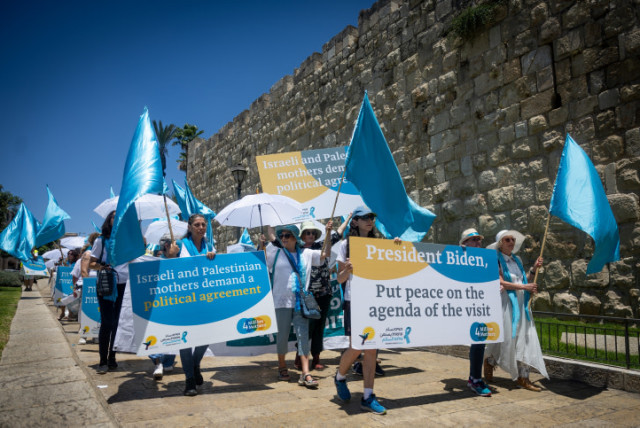Women can play a pivotal role as leaders of peace negotiations - opinion

Women Wage Peace and Women of the Sun's commitment to peace and dialogue contributes positively to the shared dream of peace.
Like most Israelis, I was deeply saddened by the senseless murder of Vivian Silver on October 7. A renowned peace activist, Silver frequently transported Gaza’s sick to Israeli hospitals for treatment. Silver also co-founded Women Wage Peace. This organization partners with the Palestinian movement, Women of the Sun. Internationally recognized, the two movements have been jointly nominated for the 2024 Nobel Peace Prize.
For more stories from The Media Line go to themedialine.org.
In seeking to understand the ramifications of the October 7 events and the ongoing Gaza war on these movements, I interviewed members of Women Wage Peace, Naama Barak and Peta Pelech—an Australian immigrant like myself—and Marwa Hammad of Women of the Sun. Their shared goal? To forge peace through dialogue, envisioning a future free from the shadows of Israeli-Palestinian violence for their descendants.
Their strategy emphasizes dialogue as the means to transcend the current deadlock. They acknowledge that neither side will eliminate the other nor persuade the other of their narrative’s justice. They advocate for a shift away from the blame game and inflammatory language. Instead of terms like "ending the occupation," they speak of "ending the conflict," focusing on constructive, forward-looking discourse.
The assumption might be that the movements would retreat and reassess their strategies in light of recent hostilities. Yet, the reality is quite the contrary. Despite the grief and loss experienced on both sides, and amid rising political tensions evidenced by shifting public opinions on a two-state solution and support for Hamas, the need for dialogue and cooperation has never been more urgent. This is a sentiment echoed by Hammad, who yearns for an end to hostilities.
Women Wage Peace boasts over 50,000 members from a broad Israeli societal spectrum, advocating for peace without prescribing a specific resolution. Women of the Sun reports 3,000 members in the West Bank and 300 in Gaza, of whom around 30 have been killed in the current fighting.
This disparity reflects differences between the two societies and the challenges they face. Israel is a vibrant democracy valuing free speech, where the majority would favor a two-state solution if circumstances allowed. Conversely, in Palestinian society most are taught to reject Jewish sovereignty and hope for Israel’s eventual destruction. Israel boasts a long history of peace activism, whereas Palestinians have often sought to delegitimize Israel and reject most forms of normalization, though they will work in Israel if it is economically beneficial to do so.
Each movement’s motivation and perspective on the current situation reflect their distinct historical narratives of the conflict.
Does not label itself left-wing or pacifist
Women Wage Peace rejects the label “left-wing” and denies being pacifist. Its members tend to believe Hamas’ military infrastructure and governing authority must be dismantled.
They see Israel’s containment policy vis-à-vis Hamas and its degrading treatment of the Palestinian Authority under Mahmoud Abbas over the past two decades as strategic missteps. It’s akin to putting a Band-Aid on a gangrenous wound: It offers temporary relief while the infection continues to fester and spread.
It’s worth noting that these policies aren’t solely Prime Minister Benjamin Netanyahu’s doing. Benny Gantz and Yair Lapid also played roles. Indeed, a majority of Israelis shared this view.
Women of the Sun desire change to live normal lives without barriers, checkpoints, or the constant threat of arrest. They aim to raise children in an environment that values life and fosters hope.
I argued that peace is unattainable without Palestinian grassroots support. This is particularly troubling given the recent rise in support for Hamas.
Women Wage Peace responded by emphasizing their role as a grassroots movement aimed at bridging gaps with Palestinians and expressing belief in a reformed Palestinian Authority as a peace partner, with support from the US, Egypt, Jordan, the UAE, and notably, Saudi Arabia
They also see this approach as a logical next step after hostilities in Gaza cease. This reflects widespread concerns about the government’s lack of a clear post-war plan.
Women of the Sun’s response downplayed Hamas’ dominance, highlighting diversity within Palestinian perspectives. They focus on grassroots issues like women’s equality and teaching the next generation to reject violence, rather than pursuing a political agenda. Asked to condemn the events of October 7, Hammad chose to denounce all forms of violence. Hammad believes Netanyahu’s governments have worsened the situation by not offering Palestinian statehood, arguing that his war conduct shows a lack of interest in peace, similar to Hamas.
It’s unclear whether Hammad views Hamas and Netanyahu as morally equivalent, but Barak noted the difference in information sources between Israelis and Palestinians, with Arab media, especially Al Jazeera, often portraying Israel unfavorably compared to Hamas. Therefore, Barak explained, Hammad’s rejection of violence and eagerness to connect with Israelis are particularly commendable.
The aspirations and goals of both movements are undeniably admirable and worthy of support. However, removing the rose-colored glasses reveals deep reservations.
Transforming a society that celebrates martyrdom poses a profound challenge.
Reversing decades of indoctrination that denies Jewish ancestral ties to Israel is a daunting task.
Overcoming decades of dehumanization of Jews in literature and propaganda is equally challenging.
Hamas’ genocidal intent, evident on October 7, raises the question: Are the long-term goals of the Palestinian Authority that different? Abbas’ pursuit of legal warfare, ongoing “pay for slay” policies, denial of Jewish land ties, and popular support for Hamas’ actions on October 7 spotlight profound issues.
Conversely, Israel’s challenge lies in offering hope, freedom, dignity, respect, and self-determination. Significant segments of Israeli society harbor animosity toward Palestinians.
The responses I received were not entirely reassuring. Barak insists the Palestinian Authority can be a peace partner. While there has been some cooperation with Israel on security in Judea and Samaria, critics argue it’s for survival, given Hamas’ support and perceptions of the Authority’s corruption. Ironically, despite Israel’s undermining of the Authority, without Israel, Hamas could turn Judea and Samaria into a more dangerous Gaza.
Hammad reiterated her core message: Society must change and move away from violence.
Despite these concerns, my admiration for Women Wage Peace and Women of the Sun remains. Their commitment to peace and dialogue contributes positively to the shared dream of peace. If their message resonates and gains traction, perhaps my reservations will dissipate. It’s a work in progress, with a long path to potential substantive results.
Barak cited renowned feminist Carol Gilligan, who observed that “women speak in a different voice” than men, focusing more on care and relationships than on rules and logic. Expanding on this, she highlighted women’s pivotal roles in resolving previously intractable conflicts in Liberia, Northern Ireland, and Colombia. A key principle of both movements is the inclusion of women in peace negotiations—a proposition I wholeheartedly support!
Romy Leibler is a former prominent business and communal leader in Australia now residing in Jerusalem, Israel.
Jerusalem Post Store
`; document.getElementById("linkPremium").innerHTML = cont; var divWithLink = document.getElementById("premium-link"); if (divWithLink !== null && divWithLink !== 'undefined') { divWithLink.style.border = "solid 1px #cb0f3e"; divWithLink.style.textAlign = "center"; divWithLink.style.marginBottom = "15px"; divWithLink.style.marginTop = "15px"; divWithLink.style.width = "100%"; divWithLink.style.backgroundColor = "#122952"; divWithLink.style.color = "#ffffff"; divWithLink.style.lineHeight = "1.5"; } } (function (v, i) { });

